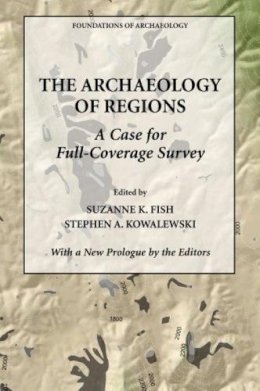
Stock image for illustration purposes only - book cover, edition or condition may vary.
The Archaeology of Regions. A Case for Full-Coverage Survey.
. Ed(S): Kowalewski, Stephen A.; Fish, Suzanne K.
€ 61.23
FREE Delivery in Ireland
Description for The Archaeology of Regions. A Case for Full-Coverage Survey.
Paperback. In this volume, originally published by Smithsonian Institution Press in 1990, the editors present eight thorough case studies on a wide range of environments and cultural contexts to argue the advantages of full-coverage survey-the systematic coverage of a whole study area. Editor(s): Kowalewski, Stephen A.; Fish, Suzanne K. Series: Ewp Foundations of Archaeology. Num Pages: 303 pages, black & white line drawings, black & white tables, maps, figures. BIC Classification: AM. Category: (U) Tertiary Education (US: College). Dimension: 153 x 226 x 19. Weight in Grams: 484.
In this volume, originally published by Smithsonian Institution Press in 1990, the editors present eight thorough case studies on a wide range of environments and cultural contexts to argue the advantages of full-coverage survey-the systematic coverage of a whole study area. A new prologue traces developments of the past two decades and shows how current archaeological practice favors full-coverage research design, both in cultural resource management and research contexts.
Product Details
Format
Paperback
Publication date
2009
Publisher
Eliot Werner Publications Inc United States
Number of pages
303
Condition
New
Series
Ewp Foundations of Archaeology
Number of Pages
303
Place of Publication
Clinton Corners, United States
ISBN
9780979773105
SKU
V9780979773105
Shipping Time
Usually ships in 15 to 20 working days
Ref
99-2
About . Ed(S): Kowalewski, Stephen A.; Fish, Suzanne K.
Suzanne K. Fish, University of Arizona, Tucson, Arizona Stephen A. Kowalewski, University of Georgia, Athens, Georgia
Reviews for The Archaeology of Regions. A Case for Full-Coverage Survey.
“[R]epresents an important step in the holistic analysis of regions. Full-coverage survey . . . has great analytical potential beyond the range of sample survey. . . This volume will aid in the development of improved research designs and the interpretation of their results.” (Martin G. Dudek, American Antiquity)
